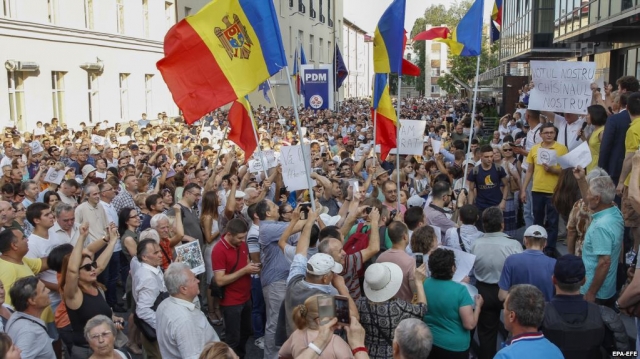EU to Reduce Financial Support to Moldova as Rule of Law and Democracy Deteriorate
On 27 November, Christian Danielsson, the European Commission’s Director-General for European Neighbourhood Policy and Enlargement Negotiations, and Thomas Mayr-Harting, Managing Director for Europe and Central Asia at the European External Action Service, visited Moldova to reaffirm the EU's commitment to deliver tangible benefits to Moldovan citizens.
They met with Moldovan President Igor Dodon, Prime Minister Pavel Filip and representatives from the opposition parties and civil society.
This visit comes amid the ongoing deterioration of the rule of law and democracy in the country, as perceived by European politicial actors. "In light of this deterioration, and in line with the principle of strict conditionality, the European Commission has taken the decision to substantially recalibrate its financial assistance and redirect support to projects that have a direct, positive impact on Moldovan citizens," reads the official statement from the European Commission.
Payments under the Macro-Financial Assistance and EU budget support programmes have been frozen, pending tangible improvements in rule of law and democracy. Moldovan authorities should take immediate action to ameliorate the situation, and promised to “continue to follow with the closest attention all aspects relevant to the preparation and conduct of the parliamentary elections in the Republic of Moldova”.
Future EU programs planned in Moldova, which are now at risk, are valued at over 106 million EUR. These programs include:
- Socio-economic development of the focal regions – Ungheni and Cahul. The support programme, worth €23 million, will contribute to the creation of jobs and value chains, provide support to local SMEs, local actors and civil society and fund the development of small-scale infrastructures. This will help boost local social-economic development and reduce the gap between Chisinau and the regions of the Republic of Moldova.
- The EU will also continue supporting the peaceful settlement of the Transnistrian conflict. Over €10 million of EU funds will help to increase confidence between Chisinau and Tiraspol through joint initiatives involving local authorities, civil society organisations and other stakeholder from both sides of the river.
- The EU will also invest €40 million in infrastructure, with the electricity interconnector between Romania and Moldova, connecting further EU and Moldova and leading to more stable and cheaper electricity for citizens.
- The EU will also further promote the international exchange of students through the Erasmus+ programme and fund more mobility opportunities for Moldovan researchers, with the aim to further scientific excellence in Moldova and increase their competitiveness in EU programmes such as Horizon 2020.
EU assistance will focus only on actions that bring direct benefits to citizens and support agents of change including civil society, independent media, reform-minded local authorities and SMEs.
By Samantha Guthrie
Source: EU Neighbours
Photo: EPA-EFE












